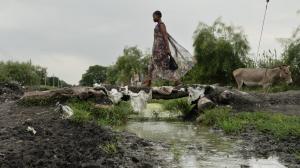Hope Must Be Kept Alive Amid Deep Divisions At UN Climate Talks
In spite of fossil fuels being low on the agenda, missing national climate targets, and gap reports spelling dark times ahead, we must stay hopeful.
LODON, UNITED KINGDOM, November 7, 2025 /EINPresswire.com/ -- As world leaders gather on Monday in Belém for the UN Climate Summit, COP30, expectations are mixed and tensions visible. Despite being called a “climate summit,” the root cause of the crisis—fossil fuels—remains largely off the official agenda.
Only 67 of 197 UNFCCC countries have submitted new or updated national climate targets, far short of expectations. The 2025 Emissions Gap Report warns that global emissions must drop by 42 percent by 2030 to keep the 1.5°C goal alive, yet current pledges fall drastically short.
“The world is sleepwalking toward a dangerous future,” said Mattias Söderberg, Global Climate Lead at DanChurchAid. “We cannot solve the climate crisis by avoiding its cause. Fossil fuels must be part of the discussion if we are serious about protecting people and the planet.”
The logic is clear. Lack of mitigation leads to global warming and climate change. This is why adaptation becomes so important. Delegates at COP30 are expected to focus on an “Adaptation Package” aimed at helping developing countries cope with worsening droughts, floods, and storms. UNEP’s latest Adaptation Gap Report estimates these countries will need 310–365 billion US dollars annually by 2035—twelve to fourteen times today's adaptation finance levels.
“Adaptation is not generosity; it is justice,” Söderberg said. “Communities in the Global South are paying the highest price for emissions they did not cause. Without drastic new investments, their survival is on the line.”
Parties remain politically far apart, and negotiations at COP30 are expected to be challenging. At the same time, competing agendas related to security, trade, and geopolitics may shape party priorities. “Hope must be kept alive amid these deep divisions,” Söderberg said, adding, “Climate change is not on hold, and we are at a point in history where everyone must do everything possible to manage this crisis.”
Mattias Sõderberg, Global Climate Lead
DanChurchAid
+45 29 70 06 09
msd@dca.dk
Visit us on social media:
LinkedIn
Bluesky
X
Legal Disclaimer:
EIN Presswire provides this news content "as is" without warranty of any kind. We do not accept any responsibility or liability for the accuracy, content, images, videos, licenses, completeness, legality, or reliability of the information contained in this article. If you have any complaints or copyright issues related to this article, kindly contact the author above.

